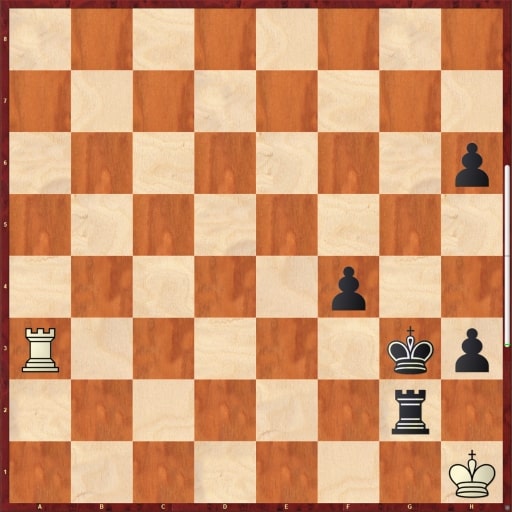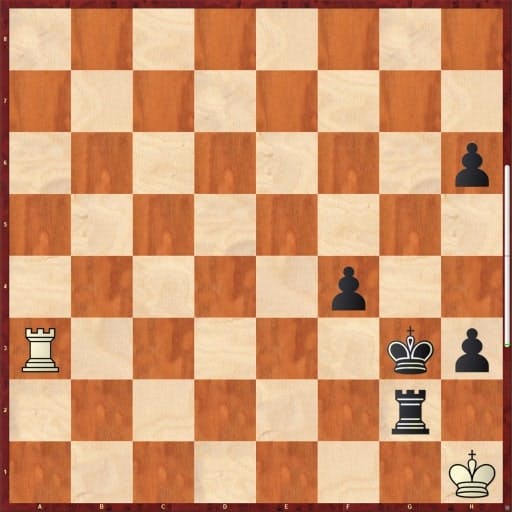This is Day 6 of my 7-Day series to kickstart your Chess Training. Each part stands on its own, but they are the most powerful if you read and apply all 7 days consecutively.
- Day 1 – The Chess Detox
- Day 2 – Mastering Mindset: Shift From Rating Goals to Skill Improvement
- Day 3 – Transforming Your Chess: The Power of Hard Training
- Day 4 – Strategic Chess Training: Maximize Impact With The 80/20 Principle
- Day 5 – Crafting Your Smart Winning Chess Plan
- Day 6 – Resilient Chess Training: Navigating Setbacks For Consistent Progress
Nobody has to improve their chess. I totally respect people who say they simply want to do the fun stuff and feel okay when they stagnate.
What I hate to see is people giving up on chess improvement because they “are too old” or “aren’t made for chess improvement”. Because that simply isn’t true. I’ve helped students aged 6 to 75+ improve their chess.
People who thought they had reached their ceiling suddenly discovered they did the wrong things or the right things the wrong way.
My message is that if you are motivated, ready to put in time and energy, and do the right things the right way, you will be able to improve.
How much? When? Those are questions I can’t answer. But you will be able to improve your skills. And slowly those skills will show in games, resulting in better scores and ratings.
In this Newsletter, I will tell stories of some of my students who achieved notable improvement without being chess professionals or anything close. They simply changed their approach, did things the right way for a consistent period, and saw results.
From No chess related Work To All-Time High And Beating IMs
Meet Jerome, a now 25-year-old graduate student currently living in Canada and doing his PhD. Jerome joined NLT on the launch last year rated between 2000-2100 OTB. He was stuck at this level for roughly 6 years without a clear chess study routine, except for doing some openings.
Due to his PhD studies, he doesn’t have much time for chess study and playing OTB games. But man did he use this time well!
14 days in Jerome reported having finished the course and started his super simple chess routine:
- 2 hours Tactics Solving in the Book Woodpecker Method
- 2 hours Analysis of his OTB Games
- 2 hours Opening study
On top, he tried to play weekend tournaments whenever he found the time. Playing his first OTB tournament after joining NLT he reported:
“Even though I “only” finished at my initial ranking last weekend, behind the different titled players, I enjoyed that tournament way more and felt less bad emotions in the end!” – Jerôme, 3 weeks after joining NLT
Shortly after we got this update in our Discord Server:
|
|
In May he reached his new all-time high rating of 2160, and in September he went 2.5/3 against IM’s in a tournament, performing 2428, roughly 400 points higher than the rating he joined with only 10 months earlier!
Jerome, if you read this, I’m very proud of you. Keep going. You inspire me and many NLT students. Who knows where this journey goes? As you mentioned yourself “get the FM title, and who knows, maybe IM at some point?”
Be Like Jerome
If you have limited time, have been stuck for a while, and have a history of not really working on your chess, then you are at the same starting point as Jerome.
I have a good and a bad message for you:
Good: Improvement is possible, even with less than 10 hours of training per week.
Bad: There ain’t no excuses anymore!
“But I’m way older than Jerome” you might say.
My Favorite Chess Improvement Story
Meet Albert. He thought the same. And won 100+ points in a year. Too old? Nope!
I dedicated a full article to Albert’s story. So I’ll keep it short right here. I started working with Albert when he was 70 years old and rated 1645 (national rating). He didn’t believe he could improve but wanted to spend some time enjoying chess lessons with a GM.
I only agreed to train him if we at least tried to improve his chess. A year later, Albert played his first FIDE-rated tournament. He not only managed to focus very well during all 9 hard-fought games, but he also scored 5/9, with only 1 loss and a performance of 1830.
My favorite game was against Udipi, a then 8-year-old youth hope of Switzerland, rated roughly 100 points higher than Albert. He got outplayed, but he wasn’t in the mood to resign. After 5 hours, the lower-rated 70-year-old came up with a stalemate trick that worked.
Read that again: a 70-year-old fights for 5 hours before tricking an 8-year-old into a stalemate. Isn’t that crazy?

You can read more about this process in my article Everyone Can Improve Their Chess or in the eBook The Art of Chess Training. The key takeaway for today is: if you want to improve your chess, don’t let anyone tell you you can’t.
Am I saying you all can become GMs? Hell no. That’s delusional.
But improvement is possible. The progress you will make will help you feel proud of yourself, gain new skills, and feel alive. As an added benefit, working on your chess is also extremely beneficial to prevent Alzheimer’s and other brain-related diseases.
How To Improve Your Chess in 2024 – Summary
That was a lot of information over the past couple of days. Repetition is key, not only to learn important tactical motifs. So don’t feel bad if you can’t remember everything this series taught you. Whenever you are unsure, just go to nextlevelchess.blog/articles, search for “2024” and you’ll find all 7 parts of this series.
Still, I’d like to summarize what I hope to be the key takeaways for chess improvers reading this series.
Here is how to improve your Chess in a Nutshell
1) Start by getting rid of your old habits. This is best done with a Detox. I suggested a 7-day detox of all chess-related activities. I’d love to hear from everyone who has tried this detox. Did you stay strong? What was most difficult?
2) Chess improvement is much better with the right mindset. Instead of focusing on your (short-term) rating, focus on your skills instead. Your goal-setting should include things like “No games with time trouble” or “solving 30 puzzles a day” rather than numbers.
3) Nothing worthwhile comes easy. If you want to improve, be ready to do things that make you feel uncomfortable. In chess, this usually means solving positions that are a little bit over your current strength. If you solve around 2/3 of puzzles correctly, you know you are doing something hard that fits your current level well.
4) If you don’t train the things that really make a difference during your games, you are wasting your time. Use the 1/3 rule to make sure you spend time on the right areas of chess improvement. In general: less opening courses, more tactics & analyzing your games!
5) Get yourself to do the training on a consistent basis by setting up a plan. Start with fewer hours than you think would be possible. Get some wins in and slowly increase the amount of time you study each week. It’s a marathon, not a sprint!
6) Things will inevitably go sideways. Life happens and before you know it you’re out of your chess routine. Think about possible roadblocks and find solutions before it is too late. Once you realize the study routine is gone, get back on track quickly by doing very small sessions. When the habit is back, increase the amount of time once again.
7) Believe in yourself! Improvers all around the world are showing that you can get better at chess. Be patient, don’t expect immediate results, and put in the hard & smart work. Eventually, you will be rewarded with better results. And throughout the journey, you will feel proud for working on yourself and sticking to a plan. Skills that help you in every area of your Life.
I hope this series helped you plan for a successful year ahead. And who knows, maybe next year I will use your success story as a motivation for other readers to do the same.
Now it is your move. Action time!
Go back and follow the instructions on each step if you haven’t yet. Write down a plan. And start with a new way of studying right now. In case you want a more thorough, step-by-step guidance by myself in the form of 10+ hours of video content, check out Next Level Training.
More than any rating gains, I wish you a lot of enjoyment and new skills learned in 2024.
Keep improving,
Noël
